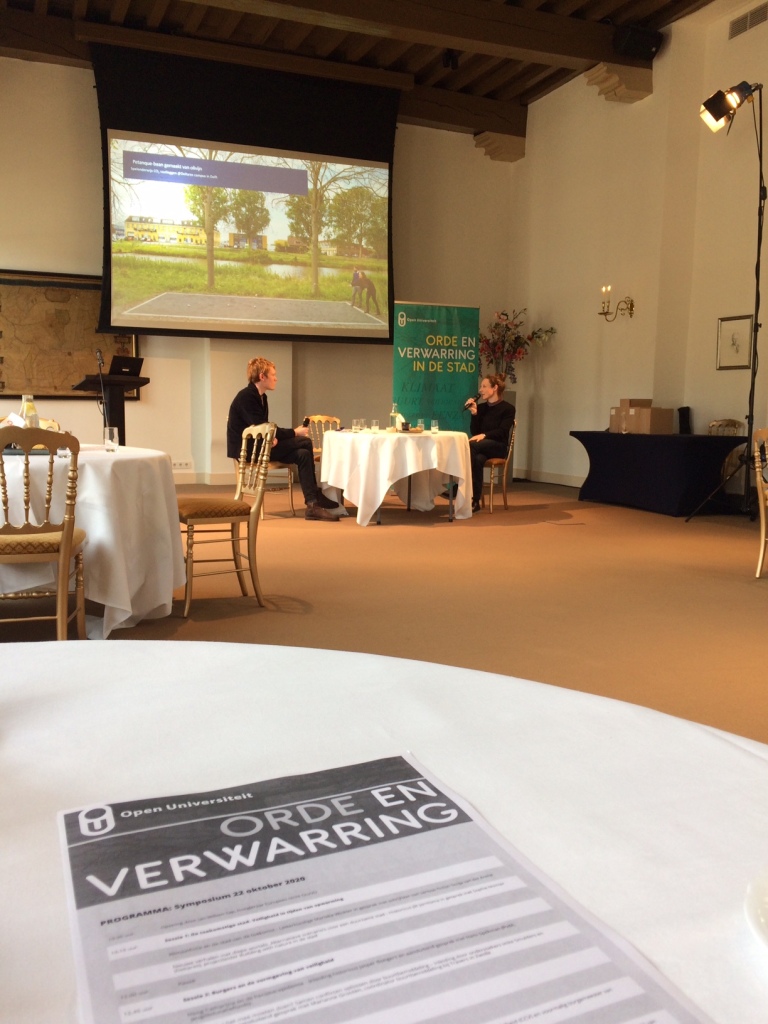Verschenen: Utopia, Equity and Ideology in Urban Texts – Fair and Unfair Cities

Deze zomer verscheen Utopia, Equity and Ideology in Urban Texts. Fair and Unfair Cities, het nieuwste deel in de Literary Urban Studies (LIURS)-serie van Palgrave MacMillan. Het boek volgt op het congres (Un)Fair Cities. Equity, Ideology and Utopia in Urban Texts dat in december 2019 in Limerick georganiseerd werd door de Association for Literary Urban Studies en het Ralahine Centre for Utopian Studies.
In ‘Imaginaries of the Future City: Envisioning Climate Change and Technological Cityscapes through Dutch Contemporary Speculative Fiction’ dat als hoofdstuk is opgenomen in dit boek, beschrijven Marjolein van Herten en ik de opkomst en ontwikkeling van de toekomstliteratuur (future novel) en speculatieve fictie in Nederland, en de recente opleving daarvan in boekhandel én academische literatuurstudie.
In het hoofdstuk bespreken we acht Nederlandse teksten die verschenen tussen 2014 en 2021: Weerwater (2015) van Renate Dorrestein; Kop uit het zand (2016) van Jan Terlouw; In alle steden (2017) van Aukelien Weverling; Klont (2017) van Maxim Februari; De goede zoon (2018) van Rob van Essen; Concept M. (2018) van Aafke Romeijn; Het boek van alle angsten (2020) van Emy Koopman; en KliFi. Woede in de Republiek Nederland (2021) van Adriaan van Dis.
De focus ligt daarbij enerzijds op de manier waarop de stedelijke en natuurlijke leefomgeving wordt verbeeld. In hoeverre wagen Nederlandse auteurs zich aan de verbeelding van fantastische nieuwe werelden of blijven zij toch liever ‘dicht bij huis’ (en waarom dan)?
Anderzijds zijn we benieuwd hoe de nieuwe interesse in extrapolatie (het verlengen, intensiveren of uitbreiden van elementen uit het heden naar een toekomst of alternatief heden) wordt verbonden aan het recente debat over Nederlandse klimaatfictie. Daarin gaan we, thematisch en formeel, op zoek naar elementen van ‘utopian hope’. Welke elementen van ‘utopian hope’ vallen te herkennen naast de duidelijke dystopische impuls in Nederlandse speculatieve (kilmaat)fictie?
Benieuwd naar onze bevindingen? Lees dan het hoofdstuk:
Marieke Winkler and Marjolein van Herten (2023). ‘Imaginaries of the Future City: Envisioning Climate Change and Technological Cityscapes through Dutch Contemporary Speculative Fiction’, in: Michael G. Kelly and Mariano Paz (eds.) Utopia, Equity and Ideology in Urban Texts. Fair and Unfair Cities. Palgrave Macmillan Cham. ISBN 978-3-031-25854-1. https://doi.org/10.1007/978-3-031-25855-8
In this chapter, we address the flourishing and fast-growing production of future novels within contemporary Dutch literature since 2014. We analyse the ways in which Dutch authors use the technique of extrapolation to envision the urban/natural environment of the future, focused on a corpus of eight future novels from the period 2015–2021. First, we argue that, by indicating and comparing both spatial and temporal ‘reality markers’, speculation in contemporary Dutch literature tends to stay ‘close to home’. Second, we demonstrate that, overall, the themes of climate change and technologization are represented as highly intertwined in diverse constellations. In addition, we try to determine in what way the stories under investigation give both formally and thematically expression to a utopian impulse: Overall, do they show utopian elements or is the urban experience predominantly dystopian?






